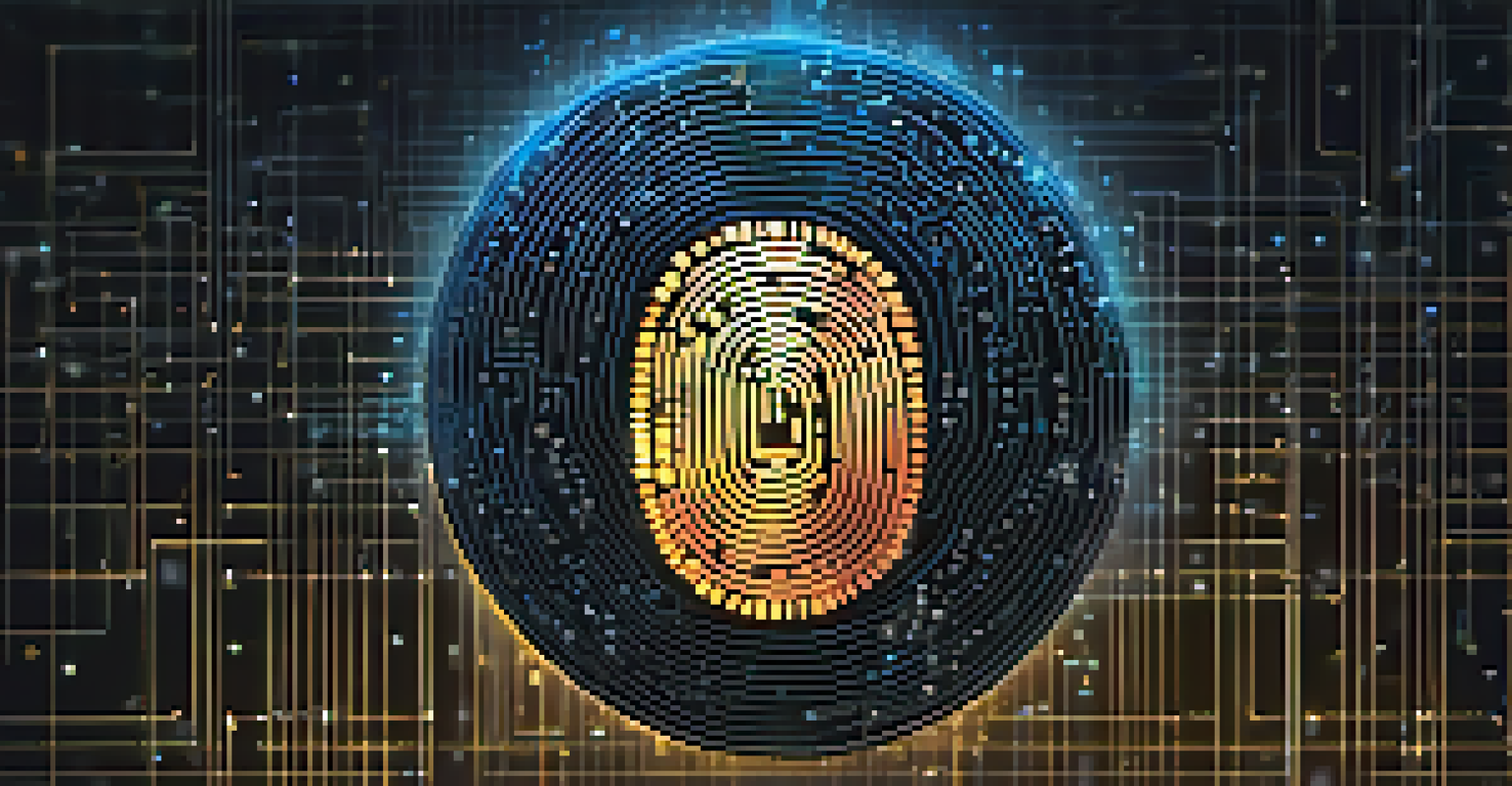Smart Contracts: Revolutionizing Digital Identity Processes

Understanding Smart Contracts and Their Functionality
Smart contracts are self-executing contracts with the terms written into code. They operate on blockchain technology, ensuring that all transactions are secure and transparent. Imagine a vending machine: you insert money, make a selection, and the machine delivers your snack without needing a cashier.
Smart contracts allow us to create automated agreements that are secure and transparent, ensuring trust without the need for intermediaries.
This automation reduces the need for intermediaries, which can speed up processes and cut costs. For example, in traditional identity verification, you might need a notary or third-party service, but smart contracts eliminate that step. This efficiency is crucial in our fast-paced digital world.
Moreover, because smart contracts are decentralized, they offer increased security against fraud. Once a contract is created and deployed on the blockchain, it cannot be altered without consensus, ensuring that all parties adhere to the agreed terms.
The Importance of Digital Identity in Today's World
Digital identity is becoming increasingly essential as more aspects of our lives move online. From social media to banking, having a secure and verifiable digital identity is crucial for accessing services. Think of it as your online fingerprint—unique to you and necessary for verifying who you are.

However, with the rise of identity theft and data breaches, traditional methods of identity verification are becoming less reliable. Users often have to share sensitive information, which can lead to vulnerabilities. A robust digital identity solution that prioritizes security and user control is more important than ever.
Smart Contracts Automate Processes
Smart contracts streamline identity verification by automating the process, making it faster and more efficient.
Smart contracts can significantly enhance digital identity processes by allowing individuals to manage their own information securely. This shift not only protects personal data but also fosters trust between users and service providers.
How Smart Contracts Enhance Identity Verification
Smart contracts streamline identity verification by automating the process. When a user submits their information, a smart contract can instantly verify it against predefined criteria. This is akin to a bouncer checking IDs at a club—if you meet the requirements, you're granted entry.
In a world where data breaches are all too common, digital identity solutions must prioritize security and user control above all.
With this automation, the verification process becomes faster and more efficient. Instead of waiting days for approval, users can gain access to services within minutes. This rapid response can be a game changer for industries like finance, where time is often of the essence.
Additionally, smart contracts can help maintain the integrity of identity data. By recording verifications on the blockchain, each step of the process is documented and immutable, ensuring that the information remains accurate and trustworthy.
Decentralization: A Game Changer for Digital Identity
Decentralization is a key feature of smart contracts, meaning no single entity controls the data. This contrasts with traditional identity systems, where centralized databases are prone to hacks and misuse. Picture a library where every book is monitored by a single librarian—if that librarian is compromised, the entire library is at risk.
In a decentralized system, users have more control over their own identity. They can choose what information to share and with whom, reducing the risk of unauthorized access. This empowerment is essential in an age where personal data is often exploited for profit.
Decentralization Enhances Security
The decentralized nature of smart contracts gives users more control over their identity, reducing the risk of unauthorized access.
Moreover, the decentralized nature of smart contracts fosters greater trust among users and service providers. Everyone can verify the terms of the contract, ensuring transparency and accountability in the identity verification process.
Real-World Applications of Smart Contracts in Identity Management
Several industries are already harnessing the power of smart contracts for identity management. For instance, in healthcare, patients can control their own medical records, granting access to providers on a need-to-know basis. This not only enhances privacy but also streamlines the sharing of vital information.
In the realm of finance, smart contracts can facilitate secure identification for banking services. Users can create a digital identity that proves their eligibility for loans or credit without exposing sensitive information. This approach reduces the risk of identity theft while providing a seamless user experience.
Additionally, the education sector is exploring smart contracts for verifying academic credentials. Graduates can have a digital certificate that employers can easily verify, eliminating the need for lengthy background checks and fostering trust in applicants' qualifications.
Challenges Facing Smart Contracts in Digital Identity
Despite their potential, smart contracts face several challenges in the realm of digital identity. One major hurdle is the lack of standardization across different platforms. Without uniform guidelines, interoperability between various systems can become a complex puzzle.
Moreover, educating users about smart contracts and blockchain technology is essential. Many people still struggle to understand how these technologies work, which can hinder adoption. It's similar to teaching someone to use a smartphone for the first time—if they don't grasp the basics, they'll likely be hesitant to use it.
Smart Contracts in Real-World Use
Industries like healthcare and finance are already leveraging smart contracts for secure identity management and information sharing.
Lastly, regulatory concerns can pose a barrier to the widespread implementation of smart contracts. Governments are still figuring out how to navigate the legal landscape surrounding blockchain technology, which can lead to uncertainty for businesses and users alike.
The Future of Digital Identity with Smart Contracts
As technology continues to evolve, the future of digital identity looks promising with smart contracts at the forefront. With their ability to enhance security, speed, and user control, these contracts can revolutionize how we approach identity verification. Imagine a world where you have complete ownership of your digital identity—sharing only what you choose, when you choose.
Moreover, as awareness and understanding of smart contracts grow, we can expect to see increased adoption across various sectors. Businesses will likely invest in developing solutions that integrate smart contracts, making digital identity processes more efficient and secure.

Ultimately, the combination of smart contracts and digital identity could forge a new path towards a more secure and user-centric digital landscape, where individuals are empowered and data breaches become a thing of the past.